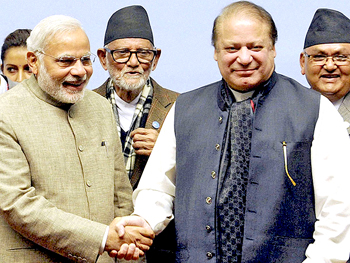 Kathmandu, Nov 28: On the last day of the 18th South Asian Association for Regional Cooperation (Saarc) summit here, Prime Minister Narendra Modi and his Pakistani counterpart Nawaz Sharif shook hands and exchanged pleasantries.
Kathmandu, Nov 28: On the last day of the 18th South Asian Association for Regional Cooperation (Saarc) summit here, Prime Minister Narendra Modi and his Pakistani counterpart Nawaz Sharif shook hands and exchanged pleasantries.
New Delhi, however, was quick to point out that Modi’s handshake with Sharif should not be construed as a signal of India’s willingness for an early restart of the stalled bilateral dialogue with Pakistan. “India is for peaceful and cooperative relation with Pakistan. We are interested in meaningful dialogue. If this interaction today (Thursday) or this handshake leads to that, we would welcome that,” Ministry of External Affairs spokesperson Syed Akbaruddin told journalists in Kathmandu shortly after the summit concluded. “The emphasis, however, is on meaningful dialogue,” he added.
Nepal Prime Minister Sushil Koirala and leaders of other south Asian nations looked on smilingly, as Modi and Sharif, who completely avoided each other during the inaugural ceremony on Wednesday, not only greeted each other, but also chatted briefly and shook hands. The day also saw signing of the Saarc Framework Agreement for Energy (Electricity) Cooperation.
Even before the public display of cordiality, Modi and Sharif warmed up to each other at a retreat in the backdrop of the majestic Himalayas in Dhulikhel, a hill town nearly 30 km south-east of Kathmandu.
As Koirala led other Saarc leaders to the terrace to enjoy the picturesque landscape, Modi and Sharif were seen standing close to each other, soaking in the pristine environs. Modi and Sharif also shook hands and exchanged greetings at an informal meeting and chatted while having lunch with leaders of the six other south Asian nations.
The retreat also provided an opportunity to the leaders to have a candid discussion, which succeeded in ending the impasse over one of the three agreements proposed to be signed during the summit.
Modi and other leaders succeeded in persuading Sharif to approve the Saarc Framework Agreement for Energy (Electricity) Cooperation.
Later, as Koirala declared the summit closed, Modi found himself surrounded by President Mahinda Rajapaksa of Sri Lanka, President Ashraf Ghani of Afghanistan, President Abdulla Yameen Abdul Gayoom of Maldives, Prime Minister Tshering Tobgay of Bhutan and Prime Minister Sheikh Hasina of Bangladesh, as they all came to greet him.
Sharif, who was on the other end of the podium, too, joined later and extended his hand to Modi.
On Modi’s invitation, Sharif had attended the swearing-in ceremony of the new government at Rashtrapati Bhavan on May 26. They also had a meeting the next day and decided to explore possibilities of restarting the dialogue that New Delhi had suspended in January 2013.
The foreign secretary-level dialogue with Islamabad was later called of to protest Pakistan’s consultation with Kashmiri separatist leaders before holding official parleys with India.






Comments
Add new comment